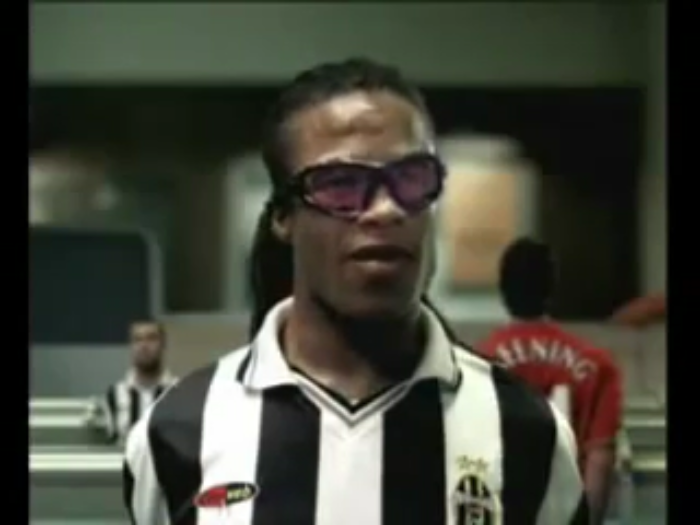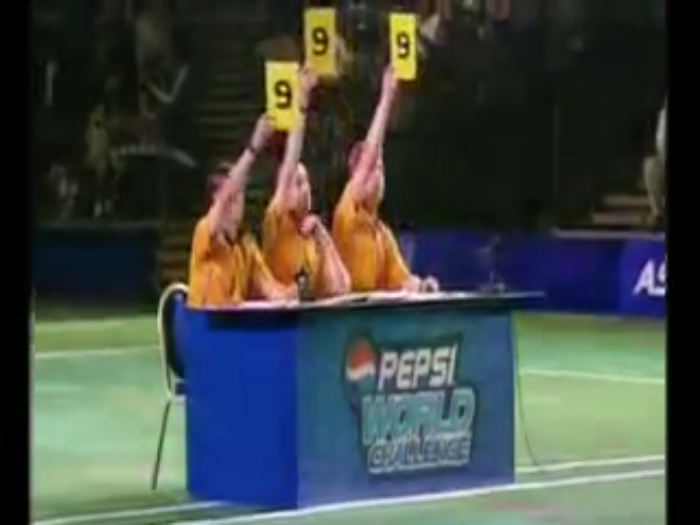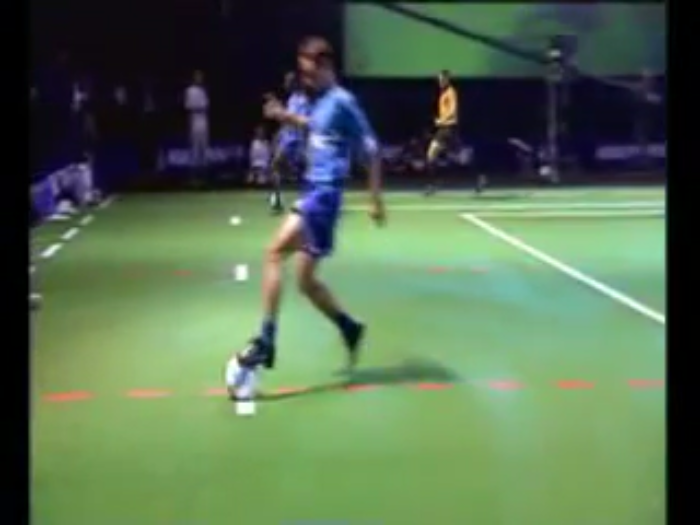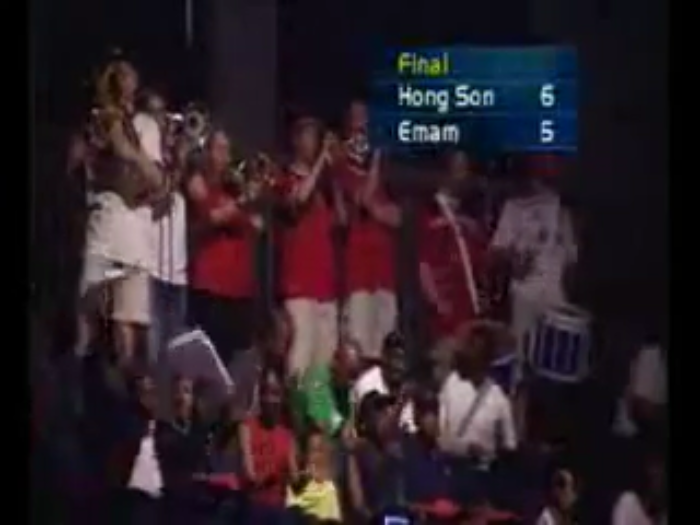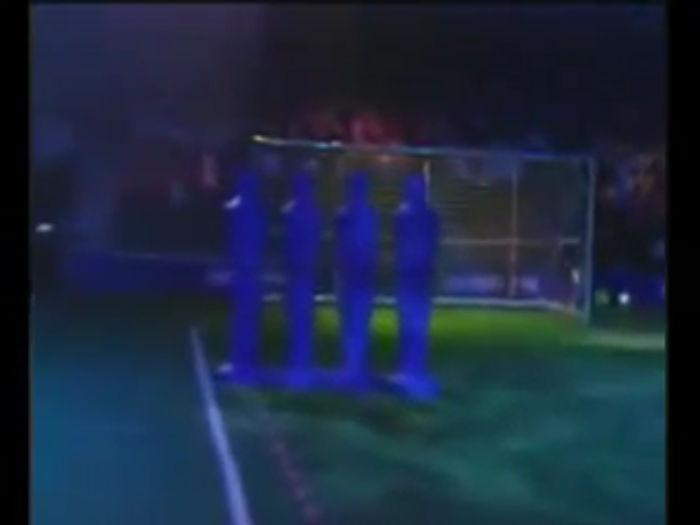A forensic analysis of the 2001 Pepsi World Challenge: Rivaldo, Beckham…
On June 17, 2001, 16 internationals from around the world descended on London to take part in the inaugural Pepsi World Challenge.
Boasting the talents of Rivaldo, Roberto Carlos, Juan Sebastian Veron, Rui Costa, Dwight Yorke, and David Beckham, the competition put these seasoned internationals to the test in five skills challenges supposedly devised by Sir Alex Ferguson himself to test passing, dribbling, ball skills, ball control and shooting,
“I purposely didn’t make the skills tests easy,” said Ferguson. “We can all take free kicks and dribble – but these test the person.”
When you discover the two tasks to which Ferguson alludes are literally just dribbling around mannequins and taking free kicks over a wall of mannequins, you get an idea of the level of glorious silliness that sits atop this entire wonderful affair.
The whole thing has the veneer and shine you’d expect from a glitzy corporate-sponsored occasion, but that is constantly undercut by constant bits of shabby amateurism.
Just to set the tone from the word go, the very first people to appear on screen after the opening graphics are presenters John Barnes and Lisa Rogers (whose caption is misspelt ‘Rodgers’), with the latter calling the tournament “a kind of World Cup for players”. Wait, what?
Introductions
The decision to introduce the players in alphabetical order continues the amateurish trend but also highlights what an eclectic bunch this is.
Out first is Sami Al-Jaber, who is confusingly listed as playing for ‘Wolves (UK)’, presumably to differentiate them from Nigerian second-tier club Warri Wolves, Australian non-league side Wynnum District Soccer Club Wolves, or defunct Canadian side St Catharine’s Wolves.
That’s not why it’s confusing though. No, that’s because Al-Jaber was not a Wolves player at the time: he had made six Division One appearances from the bench on loan from Al-Hilal some four months before the tournament even took place.
Anyway, the next guy out is some fella called David Beckham. Even if you didn’t know anything about football, the hyperactive Pepsi adverts that litter the broadcast make clear that he is at the height of his fame here.
But this is also right in the middle of perhaps the finest year of Beckham’s career: 2001 saw him win the BBC Sports Personality of the Year, make the UEFA Team of the Year and finish as runner-up to Luis Figo in the FIFA World Player of the Year vote, having helped Manchester United to the Premier League title and scored that amazing last-minute free kick against Greece that sent England to the World Cup.
Yet here Beckham is, making his entrance between Sami Al-Jaber and Okan Buruk, with no extra pomp or ceremony.
There is something very charming about the perverse refusal to acknowledge that Beckham, Rivaldo and Roberto Carlos are bigger names than Fan Zhiyi, Sergei Semak and Emmanuel Olisadebe.
It’s probably just as well, as it turns out. Though Beckham and Yorke are clearly enjoying playing to the crowd, and some of the less well-known players are trying seriously hard, many of the bigger names – especially Nolberto Solano, Rivaldo and Roberto Carlos – have never been less arsed about anything in their entire lives.
The line-up in full is as follows: Al-Jaber, Beckham, Buruk, Roberto Carlos, Rui Costa, Fan Zhiyi, Hazem Emam (listed as playing for ‘Udinise’ (sic), despite having seemingly left Udinese nearly a year prior), Li Jinyu, Nguyen Hong Son, Rafael Marquez, Olisadebe, Rivaldo, Semak, Solano, Veron, and Yorke.
Task one: Passing
The first task allegedly tests passing skills, with the players asked to hit one of three mannequins with the ball for a variety of points.
It’s not compelling television, but commentator Jonathan Pearce livens things up by going into full-on over-caffeinated Robot Wars mode.
He inexplicably calls Al-Jaber a ‘crowd favourite’; he praises Buruk’s stamina despite the task requiring each player to take a total of 10 steps at walking pace; and he mentions that Beckham is sometimes criticised for playing too many Hollywood balls, only he calls them “jackpot passes”, a phrase that has never been uttered before or since.
After it’s all mercifully over we are treated to a riveting interview with the triumphant Lin Zhinyi, the full transcript of which runs as follows:
Rogers/Rodgers: “Did you expect to win?”
[eight seconds of conversation with translator]
Translator: “Uhh, no, he says I tried my best, I just tried my best.”
Rogers/Rodgers: “You did very well, well done.”
Someone actually sat down in the editing booth and decided to keep that in. Just think about that.
Advert
David Beckham heroically defeats an equally mini Edgar Davids in a table football match despite the considerable handicap of having Jonathan Greening on his team.
Task two: Ball skills
Each player has one minute to impress the ‘all-star’ panel of judges (Premier League officials Mark Halsey, Barry Knight and Paul Taylor) by exhibiting their ball-juggling skills.
The only proviso is that they must do so while standing inside a circle of about five yards’ diameter. According to Barnes’ introduction: “If the ball leaves the circle, the player will continue with another ball.”
It’s a rule that never once comes into play despite practically every player leaving the circle with the ball at one point or another. It’s good to maintain standards, you know?
The routines are exactly the kind of fare you’d expect from such an exhibition: lots of controlling the ball between the shoulders, knee-ups, and rainbow flicks.
Seemingly not content with coining ‘jackpot pass’, Pearce calls the last of these a “donkey flick”, words that no human mouth had ever put in direct sequence until that very moment.
This time, Yorke and Beckham are left until last, and both suspiciously receive full marks from the officials – the only two players to do so – despite Beckham taking the ball out of the circle for seconds at a time and allowing the ball to touch the ground several times, both of which are in direct contravention of the stated rules.
This is exactly why we normally have neutral officials, guys.
“I wonder if Sir Alex Ferguson marks him highly in training for that, day in day out,” muses Pearce as Beckham drops to all fours with the ball on his back, badly misunderstanding both Ferguson’s personality and the role of all football coaches.
After their top-scoring routines, Beckham can then be seen openly laughing at Barnes and Rogers/Rodgers for the seriousness of their interview with Yorke.
The highlight of this section is Yorke’s introduction to the centre circle. The Trinidadian had been a regular at Old Trafford for three full seasons at this point, but it’s a fact that seemingly slips Barnes’ mind as he announces Yorke to the audience.
“The player who has lit up the Premier League for Aston Villa and…errrrrr…now, Manchester United, Dwight Yorke!”
Lovely stuff.
Advert
David Beckham heroically refuses to punch an unhygienic child in the face after he uses Beckham’s own shirt to disrespectfully wipe Beckham’s mouth germs from a can of Pepsi.
Task three: Dribbling
The players are divided into groups of four and race one another on a slalom dribble around giant mannequins. Only the fastest two from each group progress to the following round.
Because of the inherent dangers of twisting and turning at pace on a hard astroturf – Beckham falls over as he attempts to round one of the mannequins – many of the bigger-name players really don’t take this seriously, with Gabriel Clarke’s voiceover generously speculating that Rivaldo “struggled, perhaps due to a recent injury”.
The only bigger-name players who do seem to go at it whole-heartedly are Yorke and Rui Costa, both of whom reach the final against Emam and Al-Jaber after Yu and Buruk were disqualified in the semi-finals for technical infractions that almost cause Pearce’s head to explode with excitement.
Emam and Yorke are neck-and-neck in the final, causing Emam to jump to stop the ball on the designated line with such gusto that he almost ends up lamping it over the barricade and into the crowd. It pays off for him, however, and he comes away victorious.
This is easily the most successful segment of the competition from a footballing point of view – had the whole competition been at this standard, this format may well have had some legs.
Task four: Ball control
Presumably, this task was designed to test heading skills, but it ends up effectively being a two-touch version of volleyball, played with the feet.
Perhaps exhausted from the dribbling task, or perhaps just lacking in motivation after a couple of hours messing about in front of an increasingly uninterested crowd, nobody seems to put much into this, and Hong Son emerges victorious with a 6-5 defeat of Emam in the final.
Oh, by the way, the England band are in the crowd, and they really livened up the occasion by banging their drum every time a player touched the ball.
It’s exactly as fun as it sounds.
Task five: Shooting
The fifth and final task sees the players take free kicks over a wall of mannequins, with points given out depending on which section of the goal the ball flies into.
The top corners are worth most: 10 points for each, with the bottom corners worth seven.
The players seem to especially enjoy this exhibition, with the exception of Solano, who side-foots a pass into the bottom corner with the most half-arsed free kick you’ve ever seen.
“Veron had no chance to win the overall title,” says Clarke’s voiceover admiringly, “but showed his character, scoring with three of his four strikes.”
What will. What resolve. And you scoffed at the idea that these tasks would “test the person”. Veron was just weeks away from his move to Manchester United, and with Sir Alex watching on, this event must surely have sealed his move.
The finale for the day’s events is built up as a battle of free-kick masters, with Beckham going head-to-head with Roberto Carlos.
Even ignoring that they clearly picked the wrong Brazilian, the whole thing is a farce: the free kicks are taken from far too close to the goal for either of them to show off their talents, especially Roberto Carlos.
Between the two of them, they score a grand total of 25 points from a possible 80, and the 10 points each received for their third efforts were clearly given out just to give the crowd something to cheer.
The presentation
At the end of it all, Emam emerges as the overall winner, with Hong Son second and Dwight Yorke in third.
After a montage showing how Emam achieved victory, Sir Alex Ferguson comes into shot, announced by a caption, and shakes hands with a few players, before – oh. That’s it.
After literally four silent seconds on screen, the credits roll with nary a trophy handed out, and in a fitting climax to this prestigious event, the broadcast just abruptly ends. Like this.
By Steven Chicken
READ NEXT: When a player from every club raced 100m – & the hungover one won
TRY A QUIZ: Can you name England’s Xl from the 5-1 win over Germany in 2001?



























